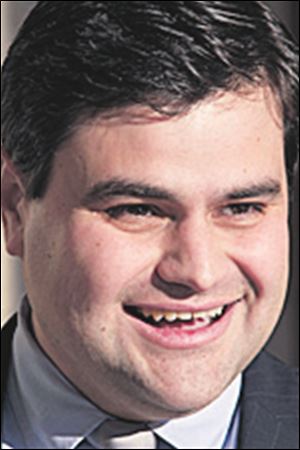
Union label shouldn’t require political uniform
1/20/2013
McNamara
Groucho Marx famously declared that he wouldn’t want to belong to any club that would have him as a member. You wonder whether Toledo City Council President Joe McNamara may feel the same way these days about the Lucas County Democratic Party hierarchy.
Mr. McNamara, who is mulling a run for mayor this year, had the temerity to oppose his party’s less-than-stellar nominee to fill a council vacancy this month. That endorsement was dictated by local union leaders and rubber-stamped by most of the council’s other Democrats — although Republican George Sarantou cast the decisive vote, claiming he wanted to keep Mayor Mike Bell from making the appointment by default.
For his display of independent thinking, Mr. McNamara could face expulsion from the county Democratic Party’s executive committee on grounds of disloyalty, although party leaders backed away from that threat late last week. One union honcho earlier proposed castration, presumably figurative.
The latter prescription gave the fair and balanced folks at Fox News an excuse to lament the state of Democratic politics in Toledo. That’s the sort of national publicity our city can always use.
“My 83-year-old grandmother has been saying Rosaries for me” in response to the threat of symbolic violence, Mr. McNamara joked last week. “It’s kind of a mess, but I did the right thing, I feel good about it, and I’d do it over again.”
The tawdry process by which Shaun Enright, an organizer for the local electrical workers’ union, joined City Council raises renewed questions about the extent to which organized labor calls the shots for council members and other local Democratic officials. Mr. Enright’s selection — despite his lack of political experience, failed past campaign for council, and checkered personal history — appeared to validate the disturbing argument by party and union bosses that labor is entitled to a designated seat on City Council.
Disturbing, because it suggests that council members’ first allegiance is not to the voters who elect them to office, but rather to the interest groups that bankroll their campaigns and lend political muscle.
Mr. Enright’s manufactured incumbency in his at-large seat will give him an advantage over other candidates should he run for a full four-year term this year, as expected.
We complain, correctly, when Republican members of Congress march in lock step to the orders of Grover Norquist or the Tea Party. We decry the excessive influence of Columbus corporate lobbies on the GOP majorities in the Gerrymandered — uh, General — Assembly.
The practice isn’t any more appealing when Democratic-leaning pressure factions engage in similar efforts at domination. Certainly these are tough times for organized labor, public and private, locally and nationally. Membership is dropping. Recession-induced state and federal budget cuts have cost too many public employees their jobs.
Appropriately, local unions helped defeat Gov. John Kasich’s effort last year to gut the collective bargaining rights of public workers. But now that neighboring Indiana and even Michigan have become right-to-work states, a similarly divisive campaign in Ohio is inevitable — and regrettable.
Still, taxpayers who watched three years ago as intransigent leaders of municipal unions worked to block Mayor Bell’s efforts to resolve the city’s budget crisis could be forgiven for asking whether labor needs, or deserves, even greater influence over city government. Either way, the county Democratic Party has made its priorities clear.
Threatening to punish a progressive, accomplished, labor-friendly politician such as Mr. McNamara because of a dissent from orthodoxy doesn’t make the party or its union overlords look good.
Perceptions of the party as a wholly owned subsidiary of organized labor could cost it potential political talent that isn’t willing merely to stick to the script.
Mr. McNamara told me last week that his conflict with party leaders could complicate his decision about running for mayor, which he expects to make next month. But he insisted “it won’t be the deciding factor.”
“Could there be a cost to this? Sure,” he said. “I’d rather have the party’s endorsement. But it isn’t a death knell if I don’t — the endorsed Democrat has not always been elected mayor.
“I haven’t had a problem getting elected without party support,” he added. “The purpose of the party is to win elections, so you want to put forth your strongest candidates, not throw out an ally. The voters I talk to are telling me: ‘We’re with you, Joe.’ ”
Lucas County’s Democratic Party would be forced to expand its base beyond its cozy accommodation with unions if it faced meaningful competition for a broad array of local offices. But as last November’s election results for county offices made clear, the county Republican Party still hasn’t figured out how to recruit and run strong slates of credible candidates who would provide that competition.
Meanwhile, now that Mr. Enright is a member of City Council, all Toledoans have an interest in his success. It’s hard to argue that his qualifications for the post were more compelling than those of Mr. McNamara’s preferred candidate, former mayor Jack Ford. Mr. McNamara’s desire to maintain the council’s racial composition with Mr. Ford’s appointment was important as well.
For better or worse, though, these questions are now moot. If Mr. Enright can help promote the progress he says he seeks on such issues as job creation, crime reduction, and neighborhood renewal, more power to him.
But when Toledo voters choose a mayor and half of the City Council this year, they’re going to have to look out for their own interests. Because they can’t assume that their parties will.
David Kushma is editor of The Blade. Contact him at: dkushma@theblade.com